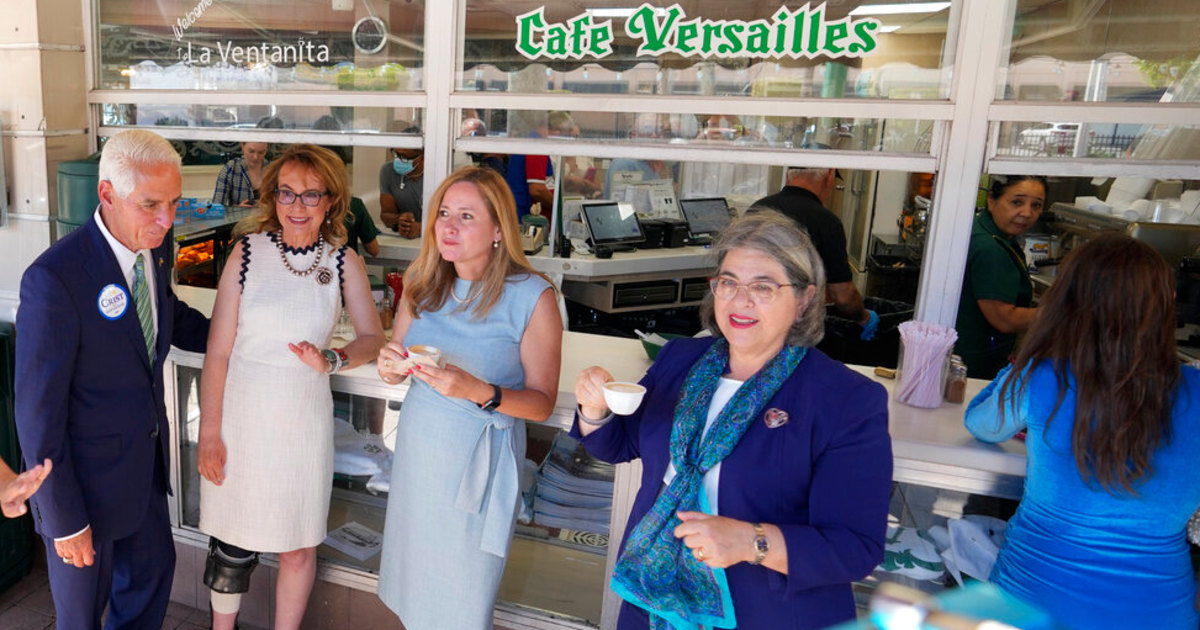The majority of Latinos in the United States support issues such as that people have the right to self-determine their gender identity and that teaching related to sexual orientation is not prohibited in schools.
This is shown by an exclusive survey by Ipsos for Axios and Noticias Telemundo, carried out in early March, at a time when several
states with a large Latino population are debating measures
that, according to activists, threaten the LGBTQ community.
In the survey, 62% said they feel comfortable living with openly LGBTQ people.
That figure rises to 70% among second-generation Latinos (of immigrant parents) and 75% among third-generation Latinos (whose parents were born in the US).
“In the midst of this wave of anti-LGBTQ legislation that we are seeing throughout the country, it is very encouraging to see that a majority of Latino adults in the United States do accept trans youth.”
Amit Paley, CEO of The Trevor Project
For several years there has been a relaxation among Latinos for LGBTQ issues.
According to studies, the percentage of people of Latino origin who identify as gay, lesbian, bisexual, trans or queer has more than doubled in the last decade, a greater increase than non-Hispanic black and white people.
And although the population was previously reluctant to accept policies such as equal marriage, now it overwhelmingly supports the right of same-sex couples to marry.
Latinos and trans issues
The data from the new Ipsos survey indicates that there is also a growing
openness in policies
that affect trans people
(people whose sex assigned at birth does not correspond to their identity or feelings) and non-binary people (those who are not defined exclusively by the masculine nor the feminine).
54% of those surveyed said that people should have the right to self-determine their gender identity, and 48% that this should also apply to adolescents.
Issues related to childhood and adolescence have just caused controversy in states like Florida and Texas.
[For more topics relevant to Latino communities, subscribe to Axios Latino]
In Florida this March, a law nicknamed "Don't say gay" was passed that vetoes the
teaching of sexual orientation or gender identity issues
in classrooms.
But two-thirds of those surveyed by Ipsos-Axios-Noticias Telemundo said they are in favor of such topics being taught.
Support was high among Mexican-Americans, Puerto Ricans and Central Americans, although it fell to 55% among Cuban-Americans.
In Texas, meanwhile, there has been controversy over an order issued by Gov. Greg Abbott in February that requires state agencies to investigate family members of trans minor Texans.
According to Abbott, gender transition treatments count as child abuse.
But 43% of Latinos surveyed said they don't consider it a form of abuse at all (23% said it could be, and the rest had no opinion).
Abbott's order was temporarily halted by a court, but before that it managed to cut off some related medical services, which can put
young Latinos at risk.
Interrupting the transition process can seriously harm the mental health of trans people, especially if they are young, warned the American Psychological Association.
In fact, in the last year under 18s from Latino families who identify as trans or non-binary have been
twice as
likely to attempt suicide,
according to the group The Trevor Project, which offers assistance to LGBTQ youth.
Overall, a young LGBTQ+ person from Latino backgrounds was 30% more likely to contemplate suicide last year than their counterparts from other demographic groups.
“In the midst of this wave of anti-LGBTQ legislation that we are seeing throughout the country, it is very encouraging to see that a majority of Latino adults in the United States do accept trans youth,” Amit Paley, the executive director of LGBTQ, told Noticias Telemundo. The Trevor Project.
Electoral power: the issues that will affect the Latino vote
Given that the
Latino vote is high in Florida and Texas
, issues such as measures related to trans youth could influence the outcome of this November's midterm elections.
In Texas there are elections for governor and for the House of Representatives.
In Florida too, and there, Republican Senator Marco Rubio is also seeking re-election.
But what issues could also affect the Latino vote in the midterm elections?
The Noticias Telemundo and Axios survey with Ipsos suggests that the main concern of Latinos will be inflation and supply chain problems.
That issue was the fourth highest concern in the first round of the Ipsos survey for Axios and Noticias Telemundo, conducted in December.
Now it has risen to first, due to an increase in prices, especially fuel, due to situations such as the Russian invasion of Ukraine.
In reaction, the favorable opinion of Joe Biden fell, from 53% to 49%.
This is how the increase in interest rates could affect you and this you can do to take care of your pocket
March 16, 202201:41
In December, the top priority of Latinos surveyed was managing the COVID-19 pandemic, followed by gun violence and crime, and with climate change the third biggest concern.
That adjustment of priorities
could determine which party Latinos will vote for in November.
[Latinos in the US are divided on the border wall, according to a survey]
From December to here, for example, the number of Latinos surveyed who said they plan to vote for a Republican candidate increased (from 15% to 17%).
In parallel, the number of Latinos who believe that the
positions of the Republican Party are better for the US economy
went from 21% in December to 24% this March.
The Democratic Party and the Republican Party had similar ratings for other issues.
For example, they are in a technical tie among Latinos in being considered the party "capable of handling crime and public safety issues."
Although it is notable that they also tie in more negative aspects.
Twenty-five percent of those surveyed believe that both Republicans and Democrats take the Hispanic community for granted, for example.
A quarter of those surveyed also said that neither party really cares about the Latino population.
The same amount believed that neither the Republican Party nor the Democratic Party represents Hispanic people.













/cloudfront-eu-central-1.images.arcpublishing.com/prisa/KMEYMJKESBAZBE4MRBAM4TGHIQ.jpg)

